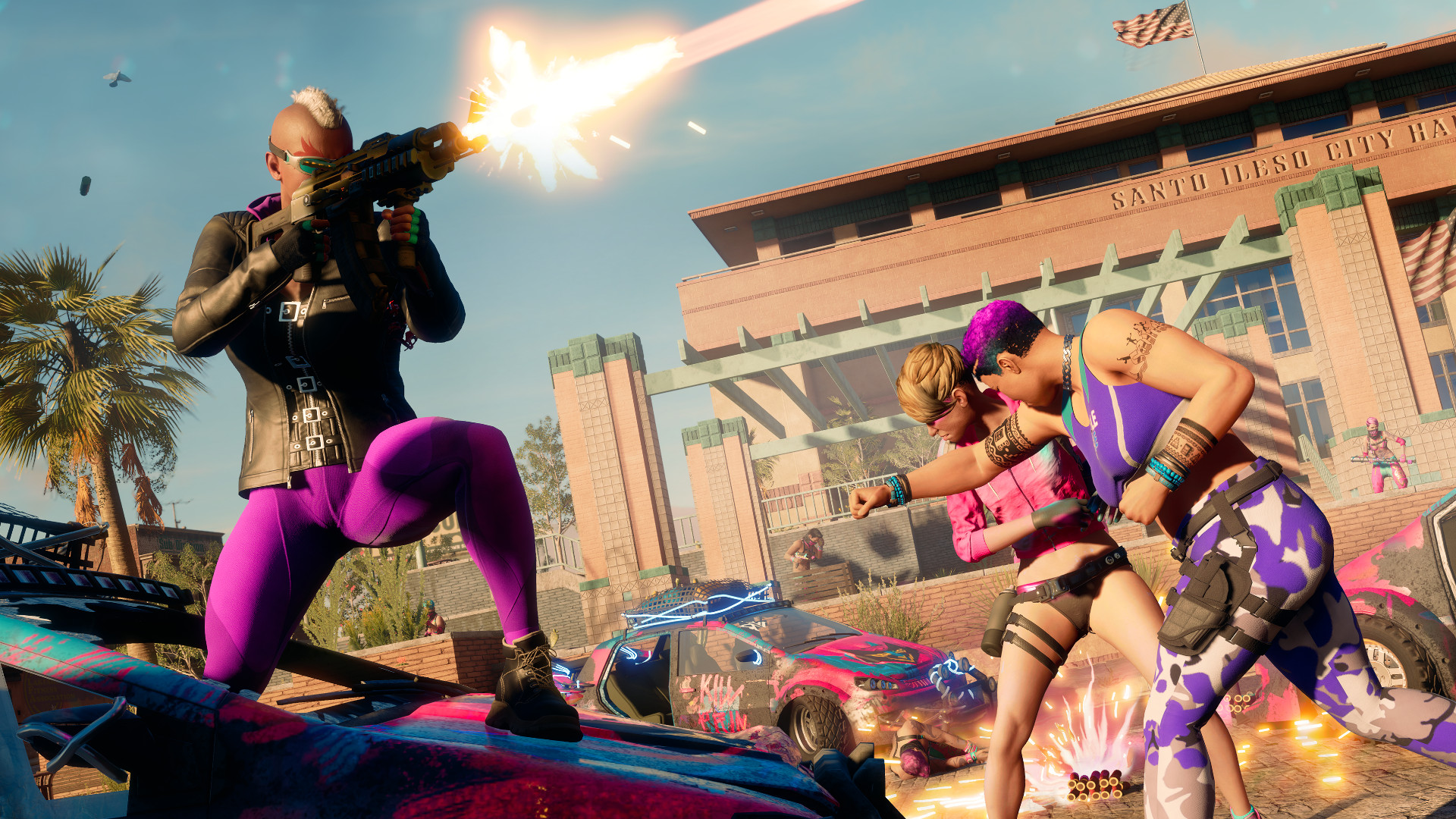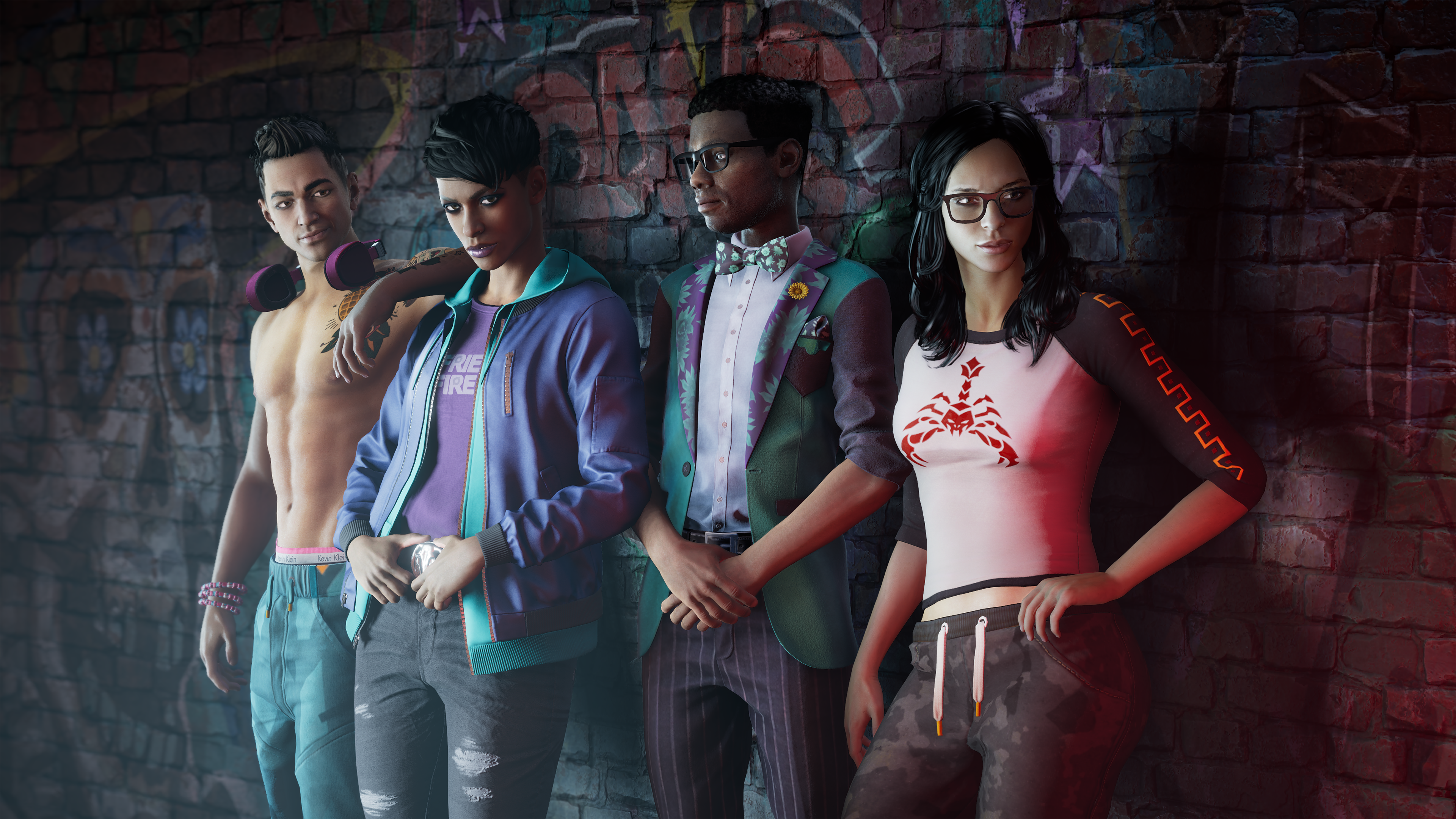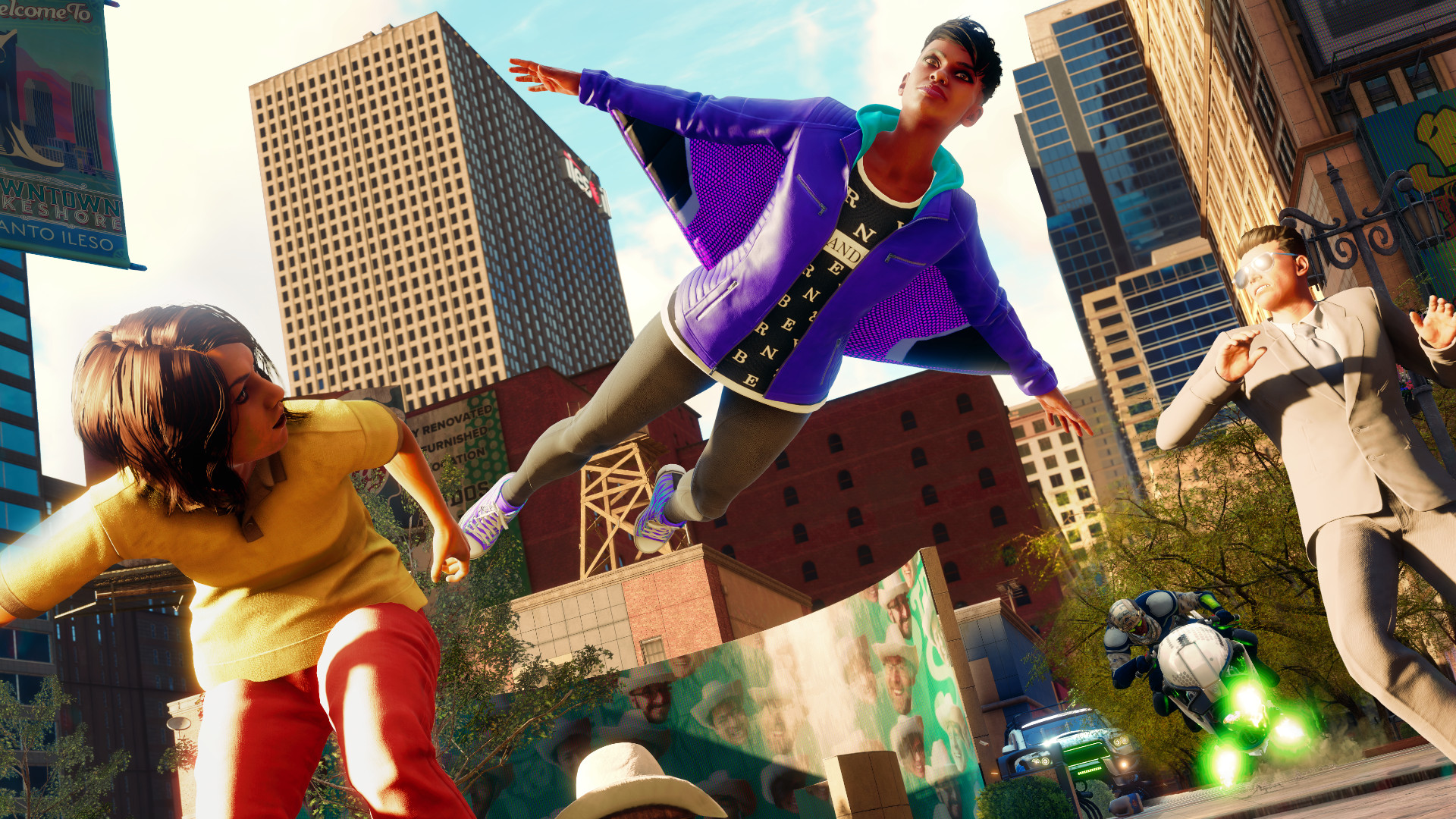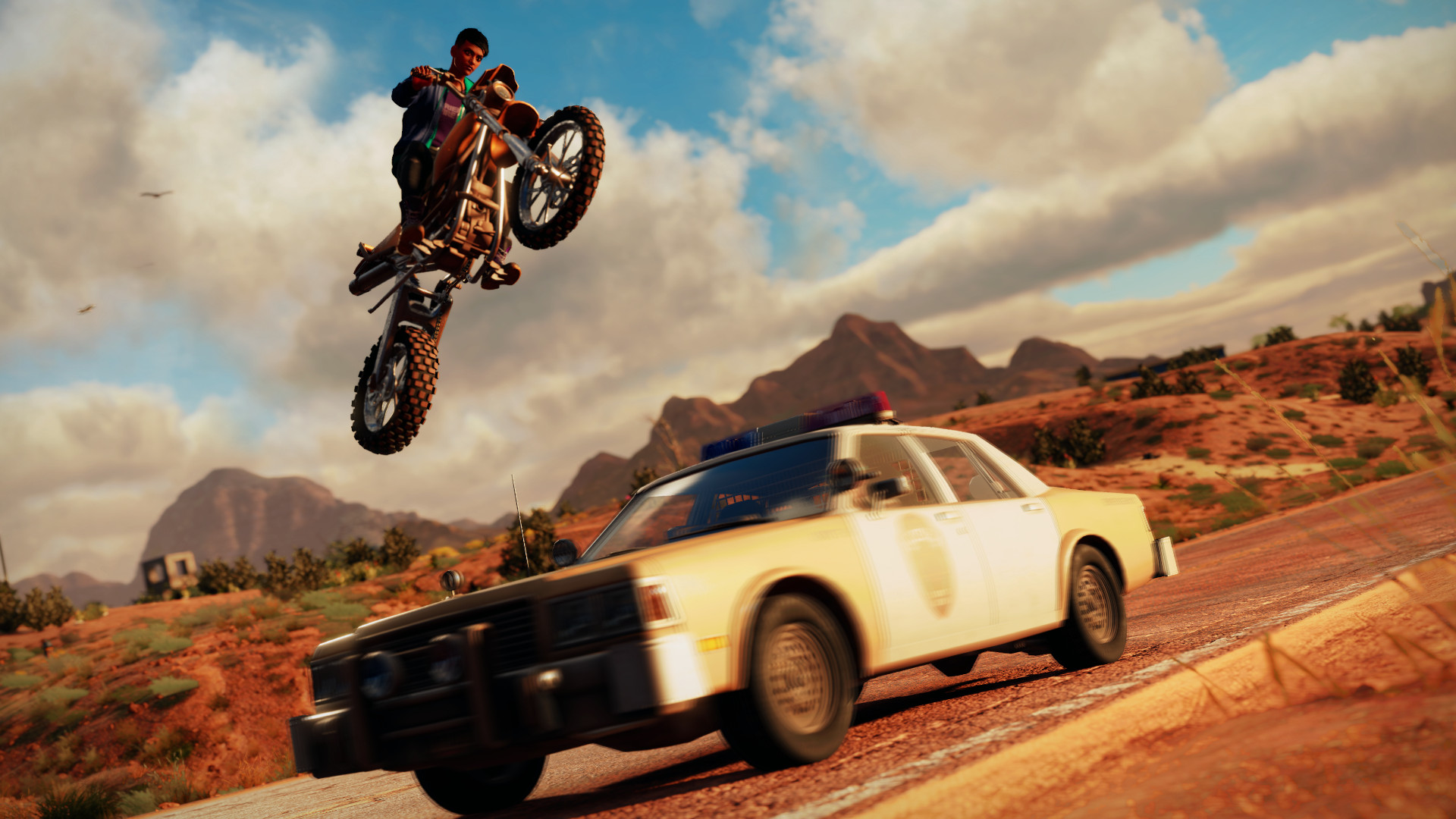There's nothing in the new Saints Row to challenge Watch Dogs, let alone GTA 5
Why martyr yourself?

I’m clinging to the roof of a dune buggy as we race into the center of a sandstorm, chased by members of Los Panteros riding dirt bikes. Gripping the vehicle with one hand, I shoot at my pursuers with the other, sending them spinning off into the surrounding dust cloud. This should be exciting. But, as with most of Saints Row, it feels like I’ve done this before in other, better games.
This new Saints Row comes nearly a decade since the last full-blooded game in the series and seven years since its last standalone expansion, Gat Out Of Hell. In returning to its open-world crime ‘em up, developer Volition has decided that, rather than continue the story of the original gang, it’s going to reboot and tell you about the formation of a new group.
These characters are all young 20-somethings struggling to make rent while working for the different gangs that populate Santo Ileso. You play The Boss, starting the game in the employ of Marshall, a heavily-armed private army. You’re joined by Neenah, a driver for Los Panteros; Kevin, who fights for Daft Punk-helmet-wearers The Idols; and Eli, who is convinced he will become a business mogul and make his millions. They go for nights out, cook family dinners, and between talking about how hard it is to pay student loans, they squabble over buying a waffle iron.

After four hours in their company, I hadn’t warmed to any of them.
It may be that, through the game, I’ll become more invested in the different Saints and their bid to found their own criminal empire. But after four hours in their company, I hadn’t warmed to any of them. I could only think of how well drawn the similarly young and criminal family unit of Watch Dogs 2 was. Those characters faced similar struggles – trying to make rent, carve out their own space, build a gang – and I liked them. I fought for them and some of the later story turns hit hard because of how invested I’d become in who they were. I hope the same will happen with The Saints, but the early part of the game hasn’t made me hopeful.
Saints Row does everything you would want it to, expect it to. You’re presented with a big open city to explore, there’s a main campaign of scripted missions, the game world is scattered with side quests to activate, you gain experience from completing missions, leveling up and unlocking new skills to use in combat. There are vehicles to steal and customize, shops where you can buy weapons and clothes. You’ll rob armored cars, compete in street races, start unscripted chaos by drawing gangs and cops into AI-driven battles.
And yet.
I can’t escape the knowledge that Saints Row doesn’t stack up against other open-world games. The dune buggy mission doesn’t look as good or feel as dramatic as the sandstorms in Avalanche’s Mad Max. Driving around the city of Santo Ileso, cars feel unresponsive and the roads I’m driving on are flat – lacking the potholes and surface differences you find in GTA V, where each car feels like part of the world. In combat, the guns lack punch and physicality, something done much better in the recent Mafia: Definitive Edition.
Sign up for breaking news, reviews, opinion, top tech deals, and more.

This Saints Row even has a wingsuit, which draws immediate and unfavorable comparisons to the Just Cause games – where that tool, paired with the grapple hook, becomes an essential and joyful way to navigate the world. In Just Cause, you start to look at every passing car, every building, and every tall tree as a potential handhold to fling yourself around. In Saints Row, there are towers dotted around the city that you can hit ‘Action’ next to, firing you into the air. Then, you glide down. It feels stagnant and compartmentalized.
Saints Row feels like a grab bag of features that sit on top of the world, disconnected from the streets below.
Again, I’ve only spent four hours with this new Saints Row. It could be that, as you extend your reach into Santo Ileso, different systems will begin to overlap – giving the game a sense of coherence. As you take control of the city, you’ll take ownership of different businesses and, as well as taking a cut of their profits, unlock quest lines to complete. This criminal empire could potentially give you a closer relationship with the city. Or maybe it will just feel like more side quests.
For the moment, Saints Row feels like a grab bag of features that sit on top of the world, disconnected from the lives unfolding on its streets.

While you can criticize Watch Dogs Legion for having repetitive missions and an unsatisfying campaign, it offered something you couldn’t find in any other open-world game. Every single NPC in its world was unique and that system then fed into all your activities across the game. I didn’t encounter any system in Saints Row that will give you the same sense of impact or purpose.
The original run of Saints Row games fought to get out from under the shadow of Grand Theft Auto and carve out their own space as an absurdist power fantasy. The first game was criticized for being a rehash of Rockstar’s market leader, but with each sequel, Volition went to places Rockstar wouldn’t. GTA’s developer was set on a veneer of realism, but Volition didn’t let itself be bound by those rules. By the end of 2015’s Gat Out Of Hell, Saints Row players had been elected president, fought off an alien invasion, gained superpowers, and even beaten the devil himself. You had effectively become a demigod, one armed with a six-foot purple dildo.
In rebooting the series, stepping back to a more intimate story, Volition has made itself smaller. So much so, it’s struggling to make itself seen.

Julian's been writing about video games for more than a decade. In that time, he's always been drawn to the strange intersections between gaming and the real world, like when he interviewed a NASA scientist who had become a Space Pope in EVE Online, or when he traveled to Ukraine to interview game developers involved in the 2014 revolution, or that time he tore his trousers while playing Just Dance with a developer.